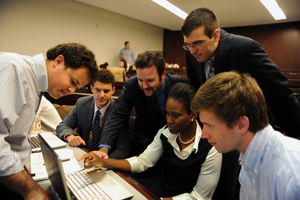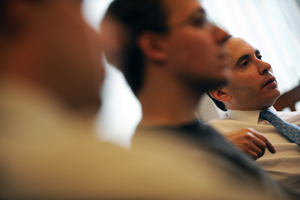Legal practice
The Law School's Corporate Lab gives students hands-on experience in the work that awaits them after graduation.
By Jason Kelly
Photography by Dan Dry


Microsoft team members meet, while Zarfes and the Accenture group conduct a conference call.
There's an old saying that law school doesn't teach you how to be a lawyer, just how to think like one. The adage has an uncomfortable ring of truth that has become a hot-button issue among legal educators. At an April "Future of Education" conference, United Technologies' general counsel Chester Paul Beach put the problem in stark terms: "We don't allow first- or second-year associates to work on any of our matters without special permission," Beach said at the conference, according to the legal blog Above The Law, "because they're worthless."
Students might graduate with deep knowledge of case law, but it's theoretical, lacking in practical application for a recent graduate at a big firm. Law School Professor and Associate Dean David Zarfes, AB'82, AM'83, the former executive vice president and general counsel of Cap Gemini Ernst & Young, has developed a course to add that essential experience to the Chicago curriculum.
Corporate Lab puts students in direct contact with companies such as Microsoft, JPMorgan Chase, Accenture, and AT&T. Groups of five to eight students are assigned to a company. The students work on issues similar to those that await them during summer internships and after they graduate-such as reviewing contracts to identify potential risk areas, surveying industry trends in negotiations or alternative-fee arrangements, labor and employment law, government contracting, intellectual property, and data privacy. "The 3Ls who are leaving now say it's exactly the work they have done in the summer at law firms," says JPMorgan Chase team leader Alex Roitman. "It's real-world, really practical stuff."
On a Thursday morning in late May, near the end of the spring quarter, the class convenes in Room I at the Law School for a session with an understandably relaxed ambiance-Corporate Lab has no final exam. Most of their work is done. Between discussions about finalizing lab projects, a few students browse Facebook, while others mingle in the back over bagels, coffee, and juice.
Groups operate independently, so the work ebbs and flows depending on client requirements, unlike the synchronized crescendos of traditional courses. Some projects will extend into the summer, with a student working as a class intern. The internship is a full-time, paid position, similar to a faculty research assistant, except it focuses on lab work. Other students volunteer time in the summer simply to remain involved with the corporate projects.
During the academic year, the time commitment can be daunting, especially when added to a traditional course load. Sean Kramer, a Corporate Lab student director, estimates the class requires about 20 hours a week-none of them billable, but the opportunities provide invaluable preparation for future professional responsibilities.
Those Corporate Lab opportunities are increasing, along with the requirements for interested students. When Zarfes established the course in 2006, Microsoft was the only "client," and he capped enrollment at 12. Soon other companies expressed an interest-the roster stands at eight for next year-making room for 35-40 students, who are selected based on interviews, academic performance, and work experience. A one-quarter obligation grew to two and, beginning in the fall, it will expand to the entire academic year.
Zarfes and lecturer Michael Bloom are also co-writing a course book about contracts and commercial transactions. The book will form the basis of a "comprehensive transactional curriculum" that combines classwork with the hands-on lab experience, augmenting the traditional education in litigation and case law.
Corporate Lab meets on Thursdays from 9 a.m. to noon, and each group has weekly conference calls with its client. Although they cannot offer legal advice, the students provide assistance the corporate lawyers use to inform their work.
With Microsoft, for example, the students contributed to a project with the International Association for Contract and Commercial Management (IACCM) designed to make the negotiation process more efficient. An IACCM study had found that many IT companies thought negotiations were hampered because of overly complex language and parties' entrenched positions.
Some of the companies provided their contract templates, which the students analyzed to determine the most contentious elements-limitation of liability, indemnification, warranty, and intellectual-property rights. Using that information, the students then drew up model contracts for buyers and sellers designed to streamline the process.
That's a more elaborate project than most; the work typically involves research specific to a company. The Accenture group's conference call, for example, focuses on a narrow question. Six students and Zarfes adjourn to a downstairs conference room for a 10 a.m. appointment. The group plans to review its memo about whether certain services the consulting and technology company offers require professional licensing-that is, whether or not a lawyer needs to be involved.
Third-year Jeff Lula leads the call, speaking to Accenture's representative, Marc Shivers. It resembles a typical corporate meeting as small talk and lighthearted humor segue into specifics. While Lula summarizes the group's research, another student and Zarfes whisper to each other and then raise questions with Shivers, who has some of his own. "Here's a disclaimer: We're not giving legal advice," Zarfes says at one point in the conversation, which reinforces the professional relevance of the lab work to the companies and students alike.
As the call ends, the students are reminded of the schoolwork still to come. "Good luck with finals," Accenture's Shivers says, "and, for those of you who are leaving the protection of law school, good luck." Exams might make even a 3L uneasy, but Corporate Lab students say they feel better about leaving law school's protective environment because of the course's demands. "You can really hit the ground running," says Kramer, who's headed for the law firm Kirkland & Ellis, "because you're in that professional mode already."
SYLLABUS
Law School Associate Dean David Zarfes brings his corporate-law background to the classroom, giving students practical experience in "providing high-level legal services" to real-world clients in a professional setting; half the grade is based on "appropriate attention to client service and collaborative efforts within a team environment."
Student director Sean Kramer estimates that it requires an average of 20 hours per week, including conference calls with clients and independent research, in addition to a weekly three-hour class meeting. "The volume of work for this class may at times exceed the number of credits to be awarded," a course description notes, "and students should bear in mind that some fruits of the lab derive from the hands-on experience and client development opportunities that each project entails."
Return to top
